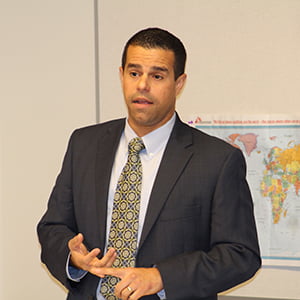
Civil Rights Attorney Pays It Forward
Carlo A.C. de Oliveira ’01 credits another Hartwick alumnus, Cyrus Mehri, Esq., ’83, with the reason he chose to specialize in civil rights law. After he graduated from Hartwick in 2001, de Oliveira landed a job in Washington D.C. with the highly-acclaimed Mehri, founding partner of Mehri & Skalet, PLLC. He worked for Mehri for two years before going to the University of Maryland School of Law in Baltimore. Mehri played a pivotal role in getting de Oliveira’s legal career started.
His mentor, Mehri “led and co-led some of the largest and most significant race and gender cases in U.S. history, including Roberts v. Texaco Inc., which resulted in a $176 million award for discrimination, and Ingram v. The Coca-Cola Company, which resulted in a $192 million settlement.” de Oliveira remembers being allowed to go on depositions when he worked as his paralegal. He said practicing law “takes more than being an ‘A’ student.” He said his “work experiences helped make law school easier and gives you a perspective making it easier to absorb the law.”
Today, de Oliveira is an attorney at Cooper Erving & Savange LLP in Albany, NY. He is an experienced litigator who is tri-lingual in English, Portuguese, and Spanish.
“I am originally from Brazil. I was a member of the Hartwick soccer team. I am by nature a competitive person….I do not want to lose a case,” he said.
Political Science major de Oliveira visited campus on October 10, 2018 at the invitation of Hartwick’s Director of Planned Giving Pat Dopazo. He spoke with two groups of students: those in Dr. Laurel Elder’s Politics, Race & Ethnicity class and a wider group of students interested in pre-law.
More than 17 years ago, de Oliveira took two of Professor Elder’s classes: Research Methods and U.S. Government. He told her class that he studied law in his native Rio de Janeiro before coming to the U.S. and did not realize that he needed an undergraduate degree before he could attend law school here.
According to de Oliveira, the education system and the legal system in the U.S. differ from Brazil where his father is a judge. He explained to the class that many judges in the U.S are appointed and some town judges who are “elected by the people” are not even lawyers. Some judges are “former correction officers.” Others are “friends with the police officers.” He described how “polarized” and “politicized” U.S. courts have become.
Being a civil rights lawyer “is a tough job,” said de Oliveira. “I do not want to discourage you from pursuing civil rights law. We need more people doing this work. The uncertainty in the legal systems right now means you can have a judge in Albany interpreting the law 180 degrees different than a judge in another part of the country.”
After describing three cases he lost that he felt he should have won based on the law, de Oliveira made a distinction between justice and the law. The function of the law is “to maintain order.” He said, “The laws are not created for justice.”
When a member of the audience asked de Oliveira why he persists, he said, “When you win a case, it makes you feel so good. It keeps you going.” He added, “If you want to make a difference in the life of three to four people, it’s worth it.”
de Oliviera learned quite a bit about competition and persistence when playing soccer at Hartwick that helped prepare him for his career as a litigator. He said, “At Hartwick, there are an amazing group of people that can help you.”
Hartwick Soccer Coach Jim Lennox was one of those people who helped shape de Oliveira’s career. Lennox recruited de Oliveira to Hartwick after Columbia-Greene Community College’s soccer team beat Hartwick 5-1. Who knew then how this story would unfold?